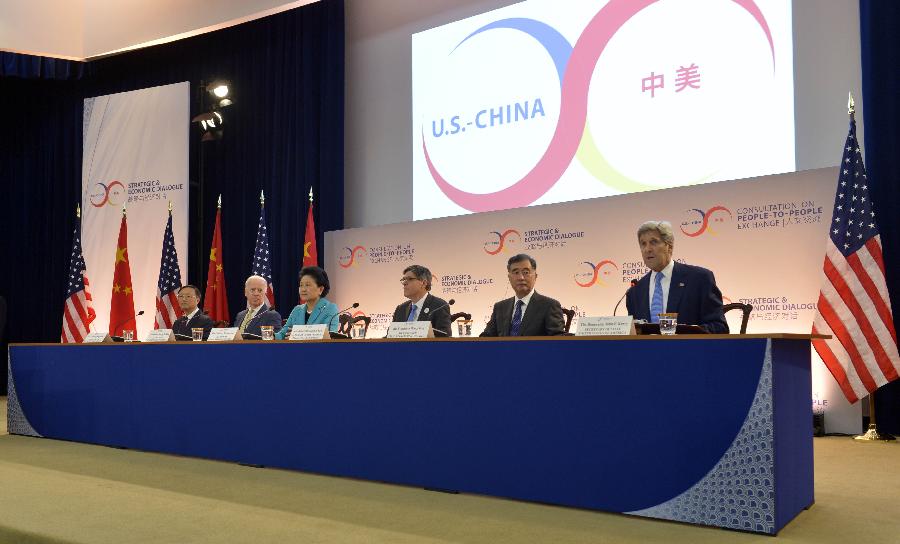
High-level officials attend the seventh China-U.S. Strategic and Economic Dialogue (S&ED) and the sixth China-U.S. High-Level Consultation on People-to-People Exchange (CPE) in Washington D.C., the United States, June 23, 2015. China and the United States opened their annual high-level talks here Tuesday to deepen cooperation in strategic and economic issues and further promote people-to-people exchanges. (Xinhua/Yin Bogu)
WASHINGTON -- China and the United Statesopened their annual high-level talks here Tuesday to deepen cooperation in strategic and economic issues and further promote people-to-people exchanges.
The seventh China-U.S. Strategic and Economic Dialogue (S&ED) and the sixth China-U.S. High-Level Consultation on People-to- People Exchange (CPE) will conclude on Wednesday.
The S&ED is co-chaired by Chinese Vice Premier Wang Yang and State Councilor Yang Jiechi, special representatives of Chinese President Xi Jinping, and U.S. Secretary of State John Kerry and Treasury Secretary Jacob Lew, on behalf of U.S. President Barack Obama.
The CPE is co-chaired by Chinese Vice Premier Liu Yandong, a special representative of Xi, and Kerry.
Speaking at the opening ceremony, U.S. Vice President Joe Bidenstressed the importance of U.S.-China cooperation in dealing with varied issues facing today's world, saying his country, instead of fearing China's rise, wants to see the Asian giant's rise as it could be a significant asset for the region and the whole world.
With an eye to the differences between the two sides, Biden said the United States welcomes "healthy and fair competition" from China and believes that whenever possible, China should be included at the table of writing the rules.
Kerry said that the U.S. is fully aware that the two countries will not agree on all issues, but "we don't accept that a narrowing of differences is beyond our reach."
Liu said that given the complexity of today's global affairs, the domain where both countries should and can cooperate is vast.
As long as China and the U.S. respect and take into consideration each other's core interest, adhere to constructive means, and avoid strategic misunderstanding and misjudgment, difference between the two sides will be managed, and their common interests will be maintained, she said.
Wang praised the annual China-U.S. high-level talks, which have gained more than 170 achievements in the past decade, for injecting "positive energy" into the bilateral ties.
It is the common wish of both sides to achieve a win-win relationship through joint cooperation and avoid the historical trap of zero-sum great power rivalry. The two countries should keep on the path of building a new model of major-country relationship to seek peaceful co-existence despite all the difficulties that they may face on the road ahead, he said.
Lew said that the U.S. and China "have an enormous stake in each other's economic performance." As the world's two largest economies, a mutually beneficial economic relationship is of great importance "not only to the prosperity of our own peoples, but to the health and development of the global economy."
Yang said that, as the largest developing country and the biggest developed nation, China and the U.S. should stand on the higher ground to look at and deal with the bilateral ties, and stick to the path of pushing forward their cooperation, working together to maintain world peace and security, and helping every nation in the world with its development.
This year's S&ED will cover a wide range of bilateral, regional and global issues of common concern, including climate change, interaction in the Asia-Pacific region, managing differences and sensitive situations, the United Nationsand multilateral affairs, science and innovation, green ports and ships, as well as fighting illegal trade in wildlife.
During the economic dialogue, officials will have in-depth discussions on macro-economic policy and restructuring, trade and investment promotion, and financial market stabilization and reform, including the exchange of "negative lists" on a mutual investment treaty, which outline sectors that are closed to foreign investment.
The CPE talks will focus on cooperation in education, science and technology, culture, health, sports, women and youth. Before heading to Washington on Monday, Liu had already visited Pittsburgh, Pennsylvania and Houston, Texas for a series of meetings and interaction with U.S. officials, athletes, college officials, and Chinese students in the United States.
This year's S&ED and the CPE, which come at a time when there are a few hiccups in bilateral relations, are also expected to pave the way for Xi's successful state visit to the United States in September.